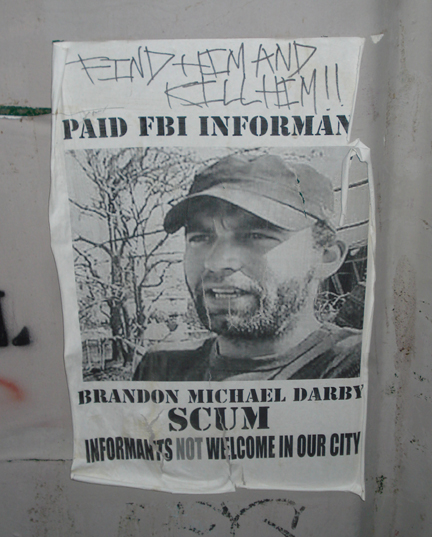The New York Times has retracted its smear of Brandon Darby yet the character assassination campaign against this American hero is only just beginning.
By way of background, Darby is the former left-wing community organizer who risked his life to prevent leftist terrorists from firebombing the GOP national convention in Minnesota in 2008. The Times falsely reported that he had “encouraged” the conspiracy even though one of the now-imprisoned terrorists admitted he lied about Darby’s complicity (and the trial judge made a specific finding that Darby was blameless — and then added extra time to the terrorist’s sentence for lying).
Over the weekend a particularly vile George Soros-funded propaganda film premiered at the South By Southwest film festival (SXSW) in Darby’s hometown of Austin, Texas. The movie is called “Better This World.” It paints Darby as someone who betrayed radical leftists everywhere for daring to love his country. The film, which could be considered anarchist porn, argues that Darby was a loathsome agent provocateur who somehow brainwashed two nasty, violent young men into doing something they otherwise would not have done. This flies in the face of all credible evidence including but not limited to the findings of the court that sent these two traitors to the hoosegow.
But the damage has already been done. Let’s look at a sampling of critics’ reactions to the leftist fantasy now captured on celluloid.
The aggressively idiotic review by John DeFore of the Hollywood Reporter leads with
A tale of law-enforcement overreach and the collision of politics with national-security concerns, “Better This World” is particularly relevant now, as its story of protesters in prison offers ironic counterpoint to the praise U.S. officials are giving activist youths on the other side of the world.
As if. The two would-be firebombers can hardly be called bona fide protesters. Would anyone consider Bill Ayers to be a mere protester?
Another dimwitted essay comes from Mike Masnick of techdirt and is yet more corroboration of the inability of leftists to process information. This fellow who obviously doesn’t know the real story initially comes across as reasonable.
There’s simply no way to suggest that the two men were “innocent” in their actions. No matter how much someone encourages (if, indeed, that’s what happened here — and it’s disputed) you to do something, you still have to take responsibility for your own actions — especially when it reaches the point of building bombs.
Good so far. But then Masnick does a 180 degree turn and whines about prosecutors pressuring the defendants to confess.
The part of the documentary that I found to be most powerful and disturbing, was how the government agents — both the federal prosecutor and the FBI agents — almost seemed to gleefully abuse their power to pressure the two arrested individuals to confess to things that both insisted were not true.
Oh my God! Police and prosecutors pressured suspects to incriminate themselves! Say it isn’t so!But in all seriousness, that’s the officials’ job. If an accused person hasn’t done anything wrong, he or she shouldn’t confess — no matter what. Masnick doesn’t seem to understand what personal responsibility actually entails.
Eric Kohn of indieWIRE understands the issues but chooses to side with evil. He calls Darby “traitorous” and claims he “radicalized” the two terrorists. With no evidence, Kohn accuses Darby of “entrapment,” and then bitches that “Darby gets to play the righteous man while his recruits face as much as 30 years behind bars.” Kohn bloviates:
However, it’s never entirely clear what inspired Darby’s betrayal, which leaves a gaping hole in the narrative. In a letter, he considers his decision to become an informant in light of larger “efforts to better this world,” but his moral ground is shaky at best. A former girlfriend discusses Darby’s excitement over the prospects of being an informant, despite the impact it has on people whose radical intentions stemmed from his own.
With a story that boils down to one man’s curious decision to fuck over his eager disciples, the movie becomes an inquiry into the tension between activism and the legal measures that strike it down. Regardless of McKay and Crowder’s motives, they were swindled out of finding the right outlet to express an authentic sentiment; Darby shut them down before they got the chance to even consider doing the right thing. When the informant finally discusses his act in an infuriating radio recording that plays over the credits, his feeble justifications make it clear that the only world he bettered was his own self-interested existence.
What utter nonsense. It’s hard to tell who hates America more — Kohn or the terrorists. Who cares about the impact on the terrorists? They are deservedly rotting in prison.
God bless Brandon Darby for loving his country more than the sick ideology he wisely left behind.
Follow me on Twitter.
(originally posted at NewsReal)


